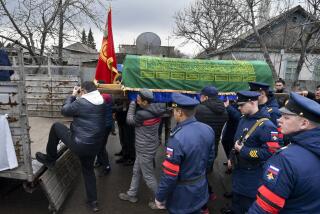A happy convergence
- Share via
Uzbekistan’s eviction notice to the Pentagon, and neighboring Kyrgyzstan’s continued welcome to the U.S. military, offer the Bush administration the chance to practice what it preaches in encouraging democracy. Uzbek President Islam Karimov’s repressive regime has been unhappy with U.S. criticism of its appalling human rights record, including the fatal shooting of more than 150 anti-government protesters during a May rally in the eastern city of Andijon. The government contended that most of the dead were “terrorists and extremists,” but witnesses cast doubt on that story. Ten days ago, the regime delivered a notice to the U.S. Embassy ordering the closure within six months of an air base used to stage military and humanitarian operations in Afghanistan.
Contrast that with Kyrgyzstan, where rigged parliamentary elections this year sparked an uprising that forced the government out of office. An opposition leader took over and invited a group of foreign observers to witness the presidential election in July. The leader of the group was pleased with the election, saying the media presented the candidates’ views fairly and the government respected such civil rights as free expression and assembly.
Uzbekistan and Kyrgyzstan were part of the Soviet Union, and Russia has tried to keep its influence and troops in the countries while excluding the U.S. The Shanghai Cooperation Organization, which includes Russia, China, Kazakhstan, Kyrgyzstan, Uzbekistan and Tajikistan, in July urged establishing a deadline for withdrawal of foreign forces -- meaning U.S. troops -- from member countries. The reason given was a decline in fighting in Afghanistan. But Defense Secretary Donald H. Rumsfeld made the case on his Central Asia visit last month that Afghanistan is still a war zone, and Kyrgyzstan said the U.S. could keep its troops there.
Uzbekistan has received $15 million for U.S. use of the base at Karshi Khanabad, or “K2,” since 2001. Karimov’s eviction order could be a ploy to get more money or muzzle Washington’s human rights demands. President Bush should do neither. The U.S. doesn’t need a big military presence in Central Asia.
The Kyrgyzstan and Uzbekistan bases have about 1,000 U.S. troops or air crews each, far fewer than the approximately 60,000 service members in Germany. The troop presence in Germany is being reduced and is expected to number about 20,000.
Rumsfeld skipped Uzbekistan last month while visiting Kyrgyzstan and Tajikistan, calling the latter nations a “great help” for operations in Afghanistan. He said the U.S. “will be fine” even if it loses K2.
Rumsfeld’s itinerary and statements send a clear message to Karimov: If he changes his mind and decides that he wants U.S. money for continued use of the base, he should be prepared to listen to more lectures about his repressive ways. Uzbekistan presents a rare and welcome convergence of the U.S. national interest and its ideals.
More to Read
Sign up for Essential California
The most important California stories and recommendations in your inbox every morning.
You may occasionally receive promotional content from the Los Angeles Times.












